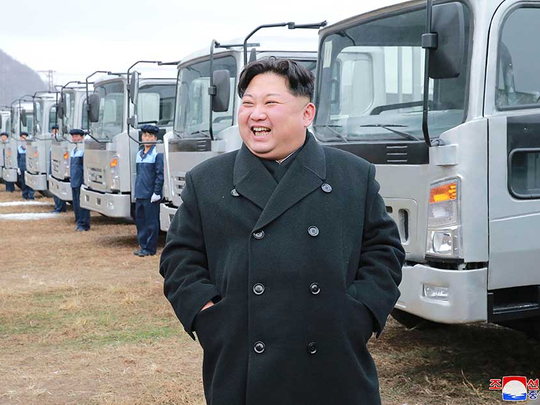
North Korea’s leader, Kim Jong-un, is disciplining the leadership of his country’s most powerful military organisation, the latest sign of his efforts to tighten his grip on party elites and the armed forces amid a nuclear standoff with the United States, South Korea’s main intelligence agency said on Monday.
Analysts and experts pay close attention to any signs of rumbling within the secretive regime in Pyongyang, seeking to determine possible implications for the stability of Kim’s rule and for his nuclear and missile programmes. They have said that Kim appeared to be using his tactic of instilling fear in the elites in order to strengthen his control as the country braced for the pain that is likely to result from recently imposed United Nations sanctions.
During a closed-door parliamentary briefing on Monday, South Korea’s National Intelligence Service told lawmakers that the North’s General Political Bureau was being “audited” by the country’s leadership for the first time in 20 years. The military organisation’s director, vice-marshal Hwang Pyong-so, and his deputies, were “punished”, according to lawmakers who briefed reporters after the session.
The General Political Bureau oversees the political life of North Korea’s 1.1-million-strong People’s Army, monitoring the loyalty of its officers. Hwang had been widely considered the No 2 man in Kim’s totalitarian regime.
The intelligence agency did not reveal how it obtained its information, but it did not use the phrases “purge” or “execution”, indicating that Hwang was reprimanded, but may still held his job. He has not been seen in public since October 13, according to the South Korean news media, which monitors the North’s state-run outlets.
South Korean intelligence officials said the General Political Bureau was being audited for “impure attitude” and that the move was spearheaded by Choe Ryong-hae, a top official of the ruling Workers’ Party, who gained more influence during a party meeting in early October. Intelligence officials in the South now believe that Choe is the head of the Department of Organisation and Guidance, the party’s most powerful agency, which Kim uses to control the country’s political and military elite.
Choe and Hwang have survived a series of often bloody purges that Kim has engineered to consolidate his authority since taking over the dynastic regime after the death of his father, Kim Jong-il, in 2011. They have emerged as Kim’s two closest allies. But in the past few years, Hwang has appeared closer to Kim than Choe, his name coming ahead of Choe’s in leadership rosters, a key indicator of the fortunes of various officials within the regime. Choe also suffered a setback in 2014, when Hwang replaced him as head of the General Political Bureau. In recent months, however, North Korea observers have begun noticing a shift.
When North Korean state media announced a recent leadership roster in October, Hwang’s name had fallen behind those of Choe and Premier Pak Pong-ju, who is in charge of the economy. Like Pak, Choe was considered more of a pragmatic administrator than Hwang, who has accompanied Kim far more frequently than Choe when the top leader inspected a recent series of weapons tests.
The rise of Choe and Pak “reflects North Korea’s intention to focus on the economy and how to overcome international sanctions, now that it has succeeded in testing a hydrogen bomb”, Cheong Seong-chang, an analyst at the Sejong Institute, a South Korean think tank, wrote in a recent analysis. North Korea claimed to have detonated a thermonuclear device in a nuclear test on September 3. North Korea has not conducted any missile tests since September 15, raising cautious hopes in the region that it might be moving to ease tensions and open talks with Washington.
One factor in the recent disciplinary action, an analyst said, is that Kim often pits his top lieutenants against one another to keep them in check and ensure their loyalty. Choe’s rise at the expense of Hwang was also seen as reflecting Kim’s attempt to use the party to curb the influence of the military, which had eclipsed the party in influence under his father’s rule.
Kim never tolerates any of his top aides accumulating enough power to challenge him. In 2013, he executed Jang Song-thaek, his uncle, who had been widely considered the No 2 in his regime, for plotting to unseat him.
— New York Times News Service
Choe Sang-Hun is Seoul correspondent for the New York Times.








